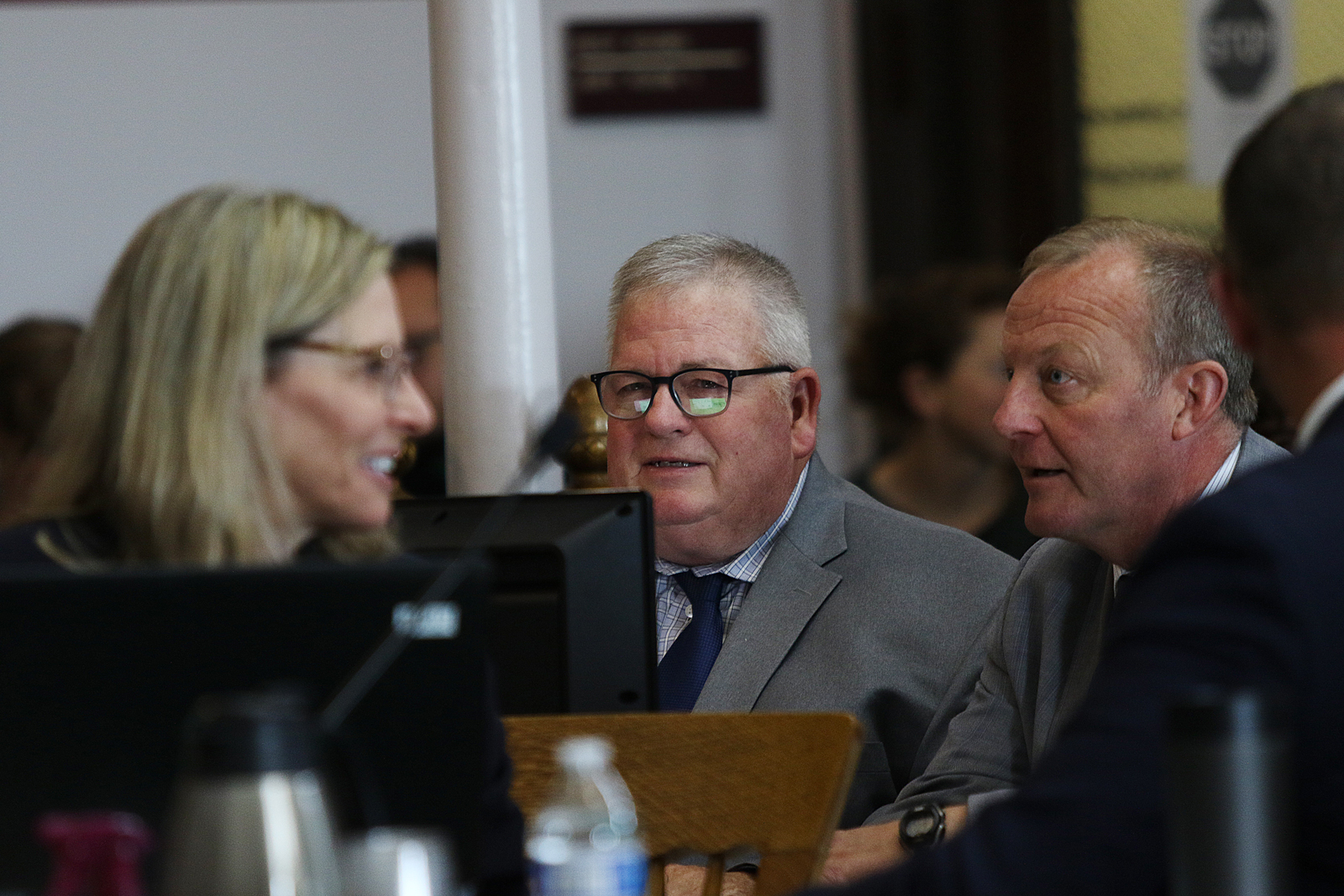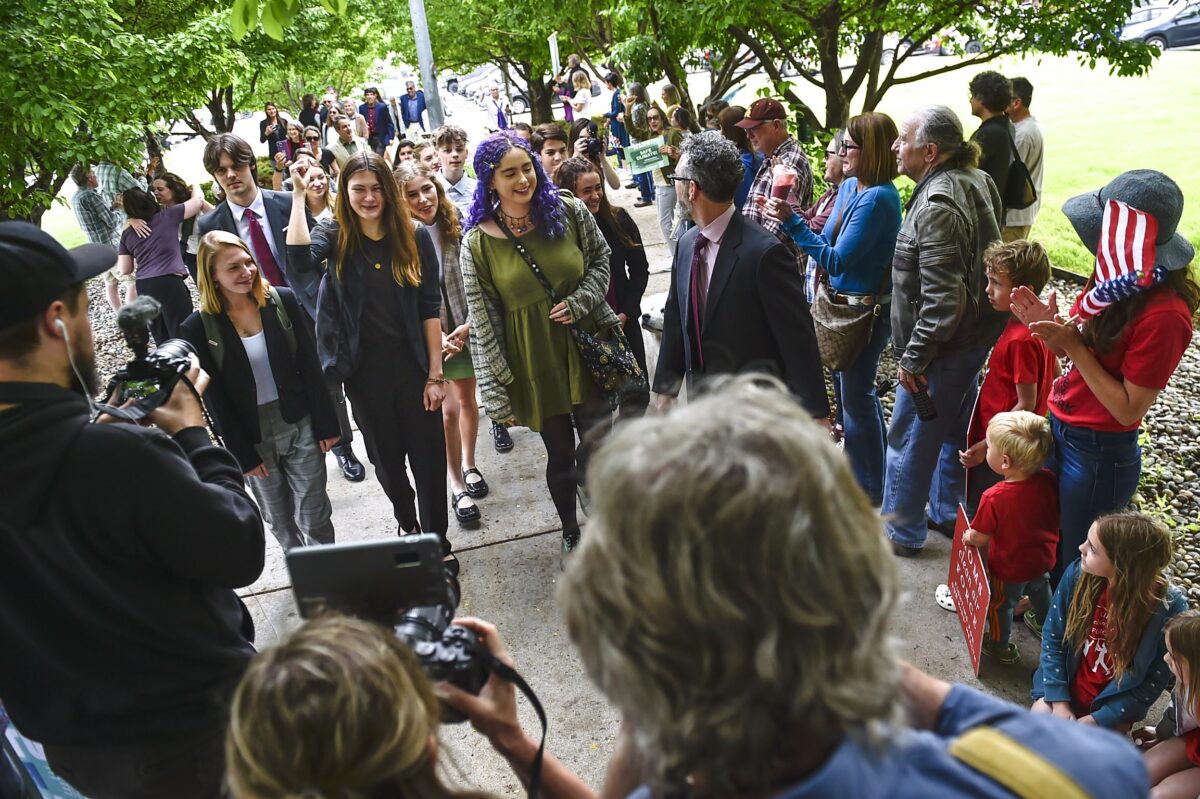State Attorneys Make Case to Overturn Youth Climate Decision
The Montana Supreme Court heard oral arguments in the appeal of Held v. Montana on Wednesday
By Micah Drew
Against a backdrop of smoke from a wildfire burning near Helena, youth plaintiffs, attorneys and climate advocates descended on Montana’s capital city for the appeal of Held v. Montana just over a year after the conclusion of the landmark constitutional climate trial.
The case was decided for the 16 youth plaintiffs by Lewis and Clark District Court Judge Kathy Seeley last August. The ruling invalidated two Montana statutes that prohibited state agencies from considering the effects of greenhouse gas emission and the impacts of climate change during the permitting process for fossil fuel projects, and prohibited courts from revoking or delaying a permit based on inadequate review of climate impacts.

Attorneys for the state of Montana argued three primary points for overturning the decision: that state agencies can’t deny a fossil fuel permit based on analysis done under the Montana Environmental Policy Act (MEPA); even if they could, climate change is a global, complex issue that cannot be resolved by the judicial branch; and the amount of greenhouse gas emissions state agencies can lawfully regulate is not enough to make a global impact and address the harms alleged by the plaintiffs.
“I don’t think they can challenge it based on global climate change,” state attorney Dale Schowengerdt said. “That issue is a complex global issue that can’t be affected by one state’s emissions.”
Kalispell-based attorney Roger Sullivan argued for the plaintiffs, recalling the five days of youth testimony that unfolded during last summer’s trial and citing the “unparalleled trial record.”
“If nothing is done, it will be much harder 50 years from now, when those young players are my age, because of this climate emergency, to which the state of Montana is a substantial contributing factor,” Sullivan said.

State attorneys reiterated arguments made during the seven-day trial before the Lewis and Clark District Court last summer that MEPA is a procedural statute and doesn’t provide an avenue to deny fossil fuel permits due to greenhouse gas emissions. However, Seeley’s ruling states that agencies must either have discretion to deny permits for fossil fuel activities or the permitting statutes themselves must be unconstitutional.
“The reason there is a constitutional injury is because the legislature told the state agencies that they could not look at the impact on Montana’s climate of the fossil fuel activities they permit,” Sullivan said. “And so the agencies haven’t, which is why the record shows that they have never denied a fossil fuel permit.”
A majority of the questions from the bench came from justices Beth Baker and Laurie McKinnon. Baker framed the question on appeal as a narrow one of “whether the legislature complied with the Constitution by foreclosing any review of this issue of greenhouse gasses,” noting that the district court refused to implement any further plan of action.
Justices Jim Rice and James Shea probed Sullivan about the general nature of the case.
“There are no permitting issues, no permitting activities, at issue here,” Rice said. “It seems like what you’re trying to do here is obtain something like a generic judgment.”
“Your Honor, the anticipatory and preventative aspects and dimension of this case could not be more clear,” Sullivan said. Referencing the 1972 Constitutional Convention, Sullivan pointed out that the delegates were clear in their intention to enshrine preventive measures against environmental degradation. “This is the appropriate mechanism to challenge what is going on, impacting these youth plaintiffs and indeed, all young Montanans now and into the future.”
“Montana’s environmental life support system has been degraded, and is threatened with far further degradation through the climate change impacts that caused the plaintiff’s injuries that are directly tied to the greenhouse gas emissions that result from defendants permitting fossil fuel activities,” he continued.
State attorney Mark Stermitz concluded the defense’s argument by reiterating the minimal effect Montana’s greenhouse gas emissions have in a global context.
“The rhetoric that is conveyed as if Montana is the sole source of this problem that we all recognize exists, it has to be reviewed in the context of absolute scientific fact.”

Following the oral arguments, the plaintiffs and their attorneys held a press conference on the lawn of the Supreme Court, with Nate Bellinger, senior attorney for Our Children’s Trust representing the plaintiffs, expressing his confidence that the landmark decision secured last year will be affirmed by the Supreme Court.
Several plaintiffs spoke briefly about the impact this case has had on their lives since it was first filed in 2020, and their own optimism surrounding what’s at stake in the future.
“This is a systemic issue. We’re not addressing this permit by permit because, for one, that’s not feasible, but for two, everything adds up,” said plaintiff Taleah Hernandez, of Polson. “We know that this part of Montana, this beautiful place where we live, is not isolated from the rest of the world … It’s not something that can be handled just one case at a time. It’s got to be a systemic overhaul to ensure our future to ensure that we get the protection that we deserve, and that we get to continue living in this beautiful place and keep it as beautiful as it is.”